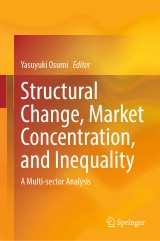Details
Structural Change, Market Concentration, and Inequality
A Multi-sector Analysis|
160,49 € |
|
| Verlag: | Springer |
| Format: | |
| Veröffentl.: | 05.07.2024 |
| ISBN/EAN: | 9789819709304 |
| Sprache: | englisch |
| Anzahl Seiten: | 160 |
Dieses eBook enthält ein Wasserzeichen.
Beschreibungen
<p>This book clarifies the mechanism of widening income inequality and declining labor share in macroeconomics, growth, technology, and the labor market, and provides policy implications. The volume covers three research themes: the influence of structural change, the advancement of artificial intelligence, and the phenomena of market concentration on inequalities and labor share dynamics in theory and empirics. The wide array of theoretical topics in this book includes the implications of unbalanced growth, economy-wide elasticity of substitution between capital and labor, relatively rising service sectors, superstar firm phenomena, automation, the heterogeneity of capital, increasing returns to scale, and the information and financial service sectors on inequalities and labor share decline. These analyses are based on multifactor, multisector general equilibrium, the goods market, and the labor market’s imperfectly competitive framework. In addition, the book covers the relevant empirical data analyses that involve top wealth dynamics in the U.S. Forbes 400, the effect of deepening ICT capital on the labor share in major Japanese industries, and the emergence of increasing returns to scale in the Japanese information and financial sectors.</p><p></p>
<p>Chapter 1: Introduction.- Part 1 Structural Change and Inequalities.- Chapter 2: “Structural Change, Service Sector Features, and Aggregate Elasticity of Substitution” Yasuyuki Osumi.- Chapter 3: “Structural Change and Evolution of Top Wealth: American Forbes 400 lists, 1990 – 2020” Atsushi Miyake and Yasuyuki Osumi.- Chapter 4: “Towards a Theory of the Labor’s Share Fall: A Dynamic Model of the “Superstar” Harutaka Takahashi.- Part 2 Artificial Intelligence and Labor Share.- Chapter 5: “Robotics, Skill-Biased Technology, and Labor Shares: A Four-Factor Case” Yasuyuki Osumi.- Chapter 6: “Automation, Tasks, and Labor Share” Kazunobu Muro.- Chapter 7: “Impact of ICT Capital on Labor Share: Evidence from Japanese Service Sectors” Kazuyuki Inagaki.- Part 3 Market Concentration and Inequality.- Chapter 8: “Automation, Goods and Labor Market Imperfections, and Labor Share” Kazunobu Muro.- Chapter 9: “Increasing Returns to Scale and Declining Labor Share in the Information Economy” AtsushiMiyake.- Chapter 10: “Firm Size, Rate of Return on Capital, and Increasing Returns to Scale: The Japanese Financial and Information Communication Service Sectors” Atsushi Miyake and Yasuyuki Osumi.<br></p>
<p>Dr. Yasuyuki Osumi is a Professor of Economics at University of Hyogo in Japan, earned his Ph.D. from Kobe University. Throughout his career, he served as a Visiting Scholar at esteemed institutions including the University of British Columbia in Canada, the Catholic University of Louvain in Belgium, and the University of York in the U.K. His primary research interests lie in macroeconomics, economic growth, technological progress, and income distribution. Dr. Osumi has significantly contributed to the field, co-editing and co-authoring research books such as <i>Studies in Medium-Run Macroeconomics: Growth, Fluctuations, Unemployment, Inequality and Policy</i>, published by World Scientific, and <i>Technological Progress, Income Distribution, and Unemployment: Theory and Empirics</i>, published by Springer. </p><br><p></p>
<p>This book clarifies the mechanism of widening income inequality and declining labor share in macroeconomics, growth, technology, and the labor market, and provides policy implications. The volume covers three research themes: the influence of structural change, the advancement of artificial intelligence, and the phenomena of market concentration on inequalities and labor share dynamics in theory and empirics. The wide array of theoretical topics in this book includes the implications of unbalanced growth, economy-wide elasticity of substitution between capital and labor, relatively rising service sectors, superstar firm phenomena, automation, the heterogeneity of capital, increasing returns to scale, and the information and financial service sectors on inequalities and labor share decline. These analyses are based on multifactor, multisector general equilibrium, the goods market, and the labor market’s imperfectly competitive framework. In addition, the book covers the relevant empirical data analyses that involve top wealth dynamics in the U.S. Forbes 400, the effect of deepening ICT capital on the labor share in major Japanese industries, and the emergence of increasing returns to scale in the Japanese information and financial sectors.</p><p></p>
Analyzes structural change, AI and market concentration to clarify mechanisms of widening inequalities Studies rising service sectors, superstar firms, automation, heterogeneity of capital, returns to scale on inequalities Data analyses of wealth dynamics in Forbes 400 and the effect of ICT capital on labor share in Japanese industries


















